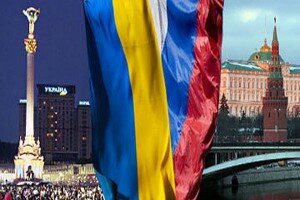
Integrity and perseverance of Kiev in matters of its European integration irritate the Russian Federation, which, under any pretext, tries to prevent the signing of the Association Agreement between Ukraine and the EU. Aware of the low efficiency of its information, political and economic attempts to influence Ukraine, the Russian side has decided to use more radical, rigid forms and methods of pressure.
For example, recently in the Russian media have appeared all sorts of estimates and projections about possible Russia's use of force against Ukraine. The authors of these publications keep ranting about the “Crimea, Southern and Eastern Ukraine's historical belonging to Russia”, warning of “the split in the Ukrainian society” and “a high probability of a civil conflict in Ukraine,” trying to prove that “Kiev infringes on the rights of Russians,” and that this can force Russia to use military force to “defend its compatriots at the Ukrainian territory.”
“The signing of this agreement will lead to political and social unrest. The standard of living will fall sharply... there will be chaos,” — Sergei Glazyev, Adviser to Russian President Vladimir Putin, promised recently in his speech at the summit in Yalta. He tried, allegedly foreseeing the future cooperation of the Ukrainian state with the European Union, to represent it in dark grays and said that Russia would apply the most severe sanctions. “Ukraine will collapse” - this leitmotif of all speeches of adherents of the Customs Union, has been caught and spread by Russian media in their reports about the summit in Yalta.
Besides, in some Russian media (internet editions of nationalist and chauvinist character), there are calls to provide strong pressure on Ukraine in order to force it to give up the rapprochement with the EU and to return under the Russian Federation's control. At this, they try to persuade the public that “Ukraine and its Armed Forces are not able to prevent Russia's protecting its interests in the Ukrainian space.”
Of course, availability of such publications does not really mean that Russia is preparing military aggression against Ukraine: regardless of how the relationship between the two countries develops, an armed conflict would have disastrous consequences both, for them and for the surrounding region (which the leadership of the Russian Federation can't help realizing). Therefore, publications on the above-mentioned topics appear within the framework of the overall campaign of the Russian Federation in the Russian media, mainly to increase the pressure on Ukraine.
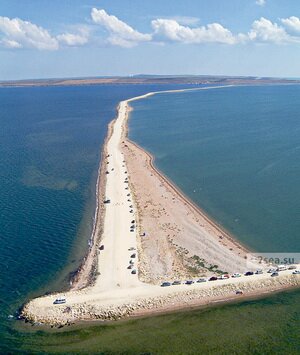 |
| In 2003, Russia began to build a dam in the direction of Tuzla. Prime Minister Mikhail Kasyanov, then emphasized that Russia does not consider the island of Tuzla http://slavyanskaya-kultura.ru |
Note that the unpredictability of the foreign policy of the leadership of the Russian Federation, as well as the increase of aggressiveness in its actions in order to achieve certain goals, do not exclude the crisis in bilateral relations. This is confirmed by provocative armed conflicts in the Crimea in 1993-1994, and events near the island of Tuzla in 2003, the military aggression of Russia against Georgia in 2008 and the massive pressure of the Russian Federation on Ukraine in 2007-2008, with the threat to use armed force in case of Kiev's signing the Plan of Actions for NATO membership.
In view of the fact that Russia is trying to resume control of the territory of the former Soviet countries and to implement strategic plans for creation of the Eurasian Union, it is quite possible that in future it can take such steps to Ukraine.
As part of a military scenario to disrupt the process of European integration of Ukraine, the most likely is the option of an armed conflict in the Crimea provoked by Russia, into which the Russian Federation could intervene under the slogan of “conducting peacekeeping operations” (like the events in Georgia in 2008).
For this purpose, can be activated, for example, pro-Russian forces of the Crimea, demanding the return of the 1992 Constitution, in which the Autonomous Republic of the Crimea (ARC) was actually defined as “an independent state”. At this, meetings and demonstrations of supporters of the “Russian idea of the Crimea” (including participation of Russian citizens-representatives of a chauvinistic, “Cossack” and other purposefully sent to the Crimea “related” forces and organizations, as it always happened at an aggravation of Russian-Ukrainian relations) can escalate into clashes with law enforcement agencies of Ukraine, which Russia would use as a pretext for its military intervention into the internal affairs of the Ukrainian state.
At present, such a scenario is impossible actually due to the Ukrainian character of the legitimate government of the Crimea, which, unlike the Crimean leadership of 1990s, is completely subordinated to Kiev and is not inclined to separatism. Taking this into consideration, Russia may resort to more sophisticated and sharp provocations, such as those used to unleash the second Chechen war in 1999.
First of all, in the Crimea can be created and be supported Islamic extremist organizations and the Crimean Tatars can be pushed to oppose local Russian-speaking population and the Ukrainian government of the ARC. In such a case, its military intervention into the situation in Ukraine, Moscow will explain by “provision of assistance to Ukraine in the matter of preventing the threat of Islamic extremism.”
Other provocative actions are also possible, in particular, like the created by Moscow conflict situation around the island of Tuzla in the autumn of 2003. If Ukraine immediately reacts to such provocations, the Russian side, “protecting its economic interests in the region”, will try to use armed force. The reason for this will be the unresolved issue of the divisions of the Sea of Azov and the Kerch Strait, thanks to which the Russian Federation arbitrarily treats, and will be treating at the crucial moment (of course, in its favor), the line of the border.
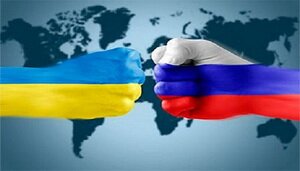 |
| Military experts are already predicting the probability of war between Russia and Ukraine http://www.kcblog.info/ |
Trying to derail the process of European integration of Ukraine and Moldova (as one of the main partners of Ukraine on the way to integration into the EU), Russia could trigger a military confrontation in the region of the recent Trans-Dniester conflict near the Ukrainian border. Russia would ask Ukraine to provide at its disposal our ground infrastructure and air space to move Russian troops to Trans-Dniester. Thus, Ukraine would not just automatically be involved in the Trans-Dniester conflict on the side of the Russian Federation, but also opposed to the West. If Ukraine does not satisfy these requirements, then Russia will accuse it of “obstructing Russia’s peacekeeping efforts in the region” and increase its pressure.
Of course, these scenarios are hypothetical and will hardly be implemented. However, some Ukrainian and foreign experts point to a number of characteristic features in the actions of Russia, revealing its preparations for the armed aggression against a neighboring state.
First of all, it concerns the scale-up campaign against Ukraine, when the European integration of our state is presented as a “threat to the national security of Russia,” and even as a “challenge to the very existence of the Russian Federation.” This way is being formed a negative attitude of the Russian population to Ukraine, as “an enemy of Russia, to whom military force can be applied.”
Secondly, the introduction by Russia of restrictions on trade with Ukraine, getting other members of the Customs Union - Belarus and Kazakhstan – involved in the case, is in fact an attempt to economically block our state in order to reduce its potential and to exclude the possibility of its counteracting the Russian side. In the same context can be interpreted Moscow's measures for reducing its dependence on Ukraine’s economic, military- technical, transport and transit spheres, including curtailing cooperation in making civil and military production, construction of new transport and energy corridors bypassing Ukraine.
Thirdly, military activity of Russia near Eastern and Southern borders of Ukraine has lately increased (and that is not only not being hidden, but is widely commented on by the Russian media). Thus, they report about the priority arming of the Western and Southern Military Districts of the Russian Federation with modern types of military equipment (new operational-tactical missile system “Iskander”, multifunctional Su-35, artillery and armored vehicles), forming new units and subunits within them (including special ones), as well as the enhancement of activities of operational and combat trainings, including to conduct of large-scale trainings and unannounced inspections. Besides, Russian media cover the plans for a large-scale rearmament of Russia’s Black Sea Fleet (which has received 9 new surface ships and 6 submarines) which is actively used by the Russian Federation for demonstration of force in the region.
Note that Russia has actually refused to cooperate with Ukraine in the most important for its own self matters in the security sphere. In particular, it refused to use (for the benefit of the Russian missile defense stations) Ukrainian missile attack warning stations, as well as the Crimean complex for training pilots of carrier-based aircrafts.
Against this background, quite revealing are conducted by Russia and Belarus in September joint strategic commandment-staff trainings “West-2013”, which, in fact, are a demonstration of Moscow's readiness to deter the U.S. and NATO intervention in the “sphere of exclusive interests of the Russian Federation” in the post-Soviet space, Russian-Ukrainian relations included. Thus, according to Russian media reports, these trainings are most actively carried out at the borders of Poland and Lithuania — the main lobbyists of Ukrainian interests in the European Union.
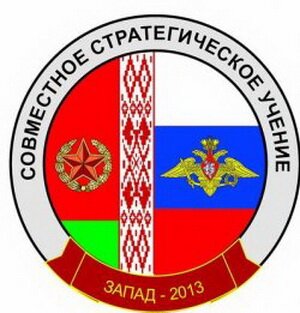 |
| Exercises "West-2013" have raised concerns of European countries, since, as in previous similar exercises, scenarios of military operations will be practiced on the border of Poland and Lithuania http://nn.by/ |
And this is a cause for concern to the leadership and politicians of these countries. In particular, according to the Head of the Lithuanian Defense Ministry Yu. Olekas, Russian-Belarusian trainings “West 2013” are openly directed against NATO and provide for seizure of the Baltic countries. At this, he draws attention to the participation in the trainings of subunits of the Strategic Rocket Forces of the Russian Federation, which confirms Russia's working on the questions of the use of nuclear weapons against the United States and the Atlantic Alliance.
This opinion shares a Polish expert — Professor at the Catholic University of Lublin R. Sheremetyev (in 1990 he was Acting Minister of Defence of Poland). He does not exclude the possibility of Russia and Belarus' preparations for an armed conflict with Poland and Baltic countries.
Analyzing such events in Russia, foreign experts find similarities with the actions of the Russian side against Georgia in 2008. Of particular concern are occurring in the disputed areas on the border between Russia and Ukraine incidents that could give rise to a bilateral conflict. In particular, as an example here is the illegal blocking by Russian border guards of Ukrainian motor boats fishing in international waters of the Azov Sea in the summer of this year, which resulted in deaths of Ukrainian citizens.
Attention is drawn to accusing Ukraine in Russian media of its refusal to support the plans of the Russian Federation for rearming the Operative Group of Russian troops in Trans-Dniester, as well as of units of Russia’s Black Sea Fleet in the Crimea. At the same time, the Russian media state that Islamic extremist organizations in the Crimean peninsula are getting activated, and among the Crimean Tatars appear separatist sentiments (which fits perfectly in the above- mentioned scenario).
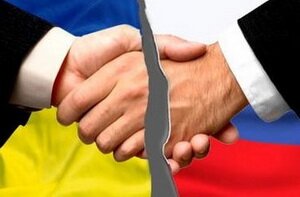 |
| In the EU, too, believe that Russia started a trade war against Ukraine http://news.pn/ |
And though such estimates and assumptions are hypothetical in nature, but in a way or another, the mentioned above actions of the Russian Federation potentially threat the security of Ukraine. More so, as the Russian pressure on Ukraine is real and covers all sectors and spheres of bilateral relations.
Naturally, under such circumstances, as allies of Ukraine are the Western countries and international organizations, who share our state's goals and interests and support its European choice. This is evidenced by statements of representatives of the United States, European Union, NATO and European countries that condemn the pressure of the Russian Federation on Ukraine and at the same time show their readiness to assist our country in overcoming the problems on the way to EU integration. Special importance is attached to the development of Ukraine's cooperation with NATO and the European Union in the military sphere, guaranteeing its national security.

